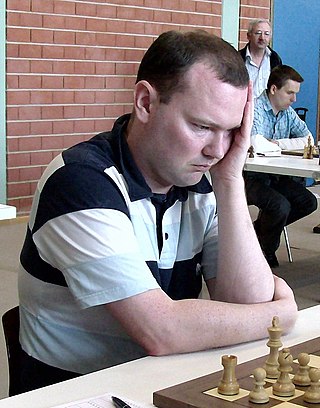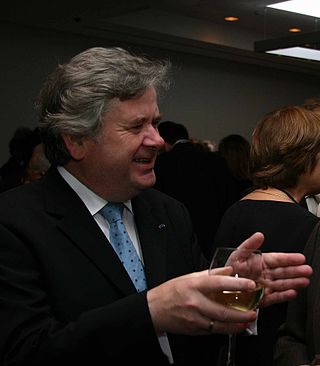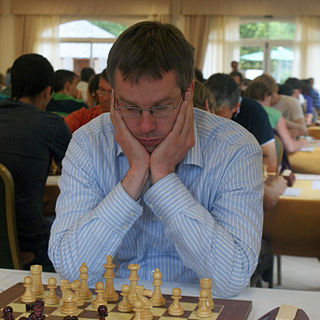| |||||
| Decades: | |||||
|---|---|---|---|---|---|
| See also: | |||||
The following lists events that happened in 1972 in Iceland .
| |||||
| Decades: | |||||
|---|---|---|---|---|---|
| See also: | |||||
The following lists events that happened in 1972 in Iceland .


Týr is a god in Germanic mythology and member of the Æsir. In Norse mythology, which provides most of the surviving narratives about gods among the Germanic peoples, Týr sacrifices his right hand to the monstrous wolf Fenrir, who bites it off when he realizes the gods have bound him. Týr is foretold of being consumed by the similarly monstrous dog Garmr during the events of Ragnarök.

Æsir or ēse are gods in Germanic paganism. In Old Nordic religion and mythology, the precise meaning of the term "Æsir" is debated, as it can refer to both the gods in general or specifically to one of the main families of gods, in contrast to the Vanir, with whom they waged war, ultimately leading to a joining of the families. The term can further be used to describe local gods that were believed to live in specific features in the landscape such as fells. In the Old English Wið færstice, the Ēse are referred to, along with elves, as harmful beings that could cause a stabbing pain, although exactly how they were conceived of by the author of the text is unclear.

In Norse mythology, Surtr, also sometimes written Surt in English, is a jötunn; he is the greatest of the fire giants, who serves as the guardian of Muspelheim which is along with Niflheim, the only two realms to exist before the beginning of time. Surtr is attested in the Poetic Edda, compiled in the 13th century from earlier traditional sources, and the Prose Edda, written in the 13th century by Snorri Sturluson. In both sources, Surtr is foretold as being a major figure during the events of Ragnarök; carrying his bright sword, he will go to battle against the Æsir, he will battle the major god Freyr, and afterward the flames that he brings forth will engulf the Earth.

Gling-Gló is the only studio album by Björk Guðmundsdóttir & tríó Guðmundar Ingólfssonar, consisting of Björk Guðmundsdóttir on vocals, Guðmundur Ingólfsson on piano, Guðmundur Steingrímsson on drums, and Þórður Högnason on bass. The album's title "Gling-gló" is the Icelandic equivalent of the English onomatopoeia "ding dong", referring to the sound that a bell makes.

Germanic paganism or Germanic religion refers to the traditional, culturally significant religion of the Germanic peoples. With a chronological range of at least one thousand years in an area covering Scandinavia, the British Isles, modern Germany, the Netherlands, and at times other parts of Europe, the beliefs and practices of Germanic paganism varied. Scholars typically assume some degree of continuity between Roman-era beliefs and those found in Norse paganism, as well as between Germanic religion and reconstructed Indo-European religion and post-conversion folklore, though the precise degree and details of this continuity are subjects of debate. Germanic religion was influenced by neighboring cultures, including that of the Celts, the Romans, and, later, by the Christian religion. Very few sources exist that were written by pagan adherents themselves; instead, most were written by outsiders and can thus present problems for reconstructing authentic Germanic beliefs and practices.

Steingrímur Hermannsson was an Icelandic politician who served as prime minister of Iceland from 1983 to 1987, and again from 1988 to 1991. He was the chairman for the Progressive Party from 1979 to 1994.

Björk Guðmundsdóttir & tríó Guðmundar Ingólfssonar was an Icelandic jazz music band. The band formed in 1990 when singer and songwriter Björk, who at the time sang for The Sugarcubes, joined the tríó Guðmundar Ingólfssonar with pianist Guðmundur Ingólfsson, drummer Guðmundur "Pappa Jazz" Steingrímsson, and bassist Þórður Högnason.

The Icelandic men's national handball team represents Iceland in international men's handball. It is controlled by the Icelandic Handball Association.

Hannes Hlífar Stefánsson is an Icelandic chess grandmaster. He has won the Icelandic Chess Championship a record thirteen times.
Jón is an Old Norse common name still widely used in Iceland and the Faroes. According to Icelandic custom, people named Jón are generally referred to by first and middle names and those without a middle name are referred to with both first name and patronym disambiguation is required.

Gone Postal is a four-piece Icelandic death metal band from Kópavogur, Iceland, founded in 2007 by Haukur Hannes and Nökkvi G. Gylfason.

Guðmundur Steingrímsson is an Icelandic politician. He is the son and grandson of former Icelandic Prime Ministers Steingrímur Hermannsson and Hermann Jónasson, respectively.

The First cabinet of Davíð Oddsson in Iceland was formed 30 April 1991.

Guðmundur Árni Stefánsson is an Icelandic politician and diplomat. He was a member of the Althing from 1993 to 2005, was Minister of Health and Social Security and Minister of Social Affairs, and has served as Iceland's ambassador to several countries.
The Icelandic Sportsperson of the Year is an annual award given to the best Icelandic sportsperson of the year. The winner is selected by the Icelandic Association of Sports Journalists. It was first given in 1956 to the triple jumper Vilhjálmur Einarsson, who is also the person with the most awards with five. Traditionally, the award is given at the Sportsperson of the Year Ball which is attended by journalists and sportspeople.
The following lists events that happened in 1947 in Iceland.
The Valur men's basketball team, commonly known as Valur, is a basketball team based in Reykjavík, Iceland. It is part of the Valur multi-sport club.

Héðinn Steingrímsson is an Icelandic chess grandmaster. He is a three-time Icelandic Chess Champion and was World U12 Chess Champion in 1987. He is the No. 5 ranked Icelandic player as of September 2020.
Steingrímsson is an Icelandic patronym, meaning son of Steingrímur. Notable people with the surname include: